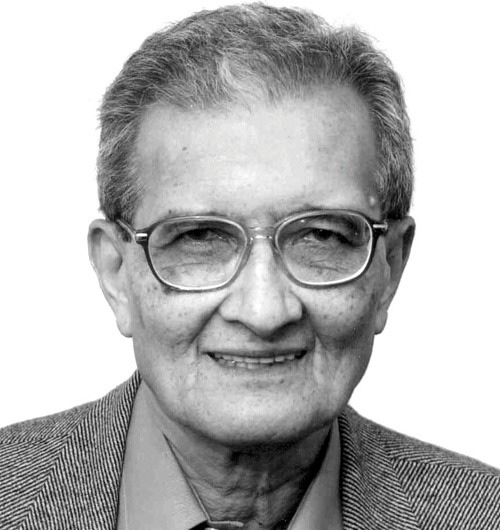
This article is a preview from the Spring 2017 edition of New Humanist. You can find out more and subscribe here.
Amartya Sen is professor of economics and philosophy at Harvard University. In 1998 he won the Nobel Prize in Economics. Much of his work has focused on poverty, specifically looking at new methods to predict and fight famines. An expanded edition of his 1970 classic Collective Choice and Social Welfare is published by Penguin.
Your reissued book explores the idea of “social choice”. What does that mean?
People live together in societies. For taking social decisions the views of the individuals constituting a society have to be put together. The interests and values of different people have to be combined to form a coherent idea of what a society wants. However, since a society is not a person, it cannot be described as wanting something in the way that a human being might want, say, a glass of water. So when we think about social choice, we need to ask: in what sense – in the discipline of language – can we sensibly talk about a society wanting one thing or another? How can we think about society choosing between alternatives, taking note of and reflecting the views of the members of the society regarding those alternatives?
How might we benefit from thinking in this way?
It makes us reflect analytically, and it also takes us to questions of priority. We may plausibly proceed to ask: what are the principles that democracy must sensibly pursue, emphasise and adhere to, and do this without contradiction? It ends up being, at least in part, a critical and constructive exercise about what democracy should be about.
What is the best way to think about poverty?
Income should not be the only factor to be considered. More broadly, poverty can be seen as deprivation of our capability to do things that we have reason to value as essential for a minimally decent life, such as being well-nourished, free from avoidable morbidity and premature mortality, being literate and numerate, being able to take part in the life of the society, and so on. Income influences all these things, but it is not the only factor that influences these capabilities.
Of course, in battling poverty in some extreme form, income may be the first thing to look at. For example, in a famine where people are dying because they do not have money to buy food, it may make sense to tackle the problem by giving people an income, or of course food. But if you are trying to assess poverty more generally, you may find that income gives you misleading signals.
Presumably this can be also applied to the West?
Yes, the need for moving the idea of poverty away from exclusive concentration on income to the deprivation of human capability yields a very general approach – it is not regionally confined. But in making a particular diagnosis of the extent of poverty in a particular society, we must take into account the exact circumstances of the people we are talking about and the society in which they live.
The relevant circumstances vary widely across the world. For example, if you have a comparatively low income in a rich country – even though your income is quite high by international standards – you may suffer from absolute deprivation, because you may have difficulty in taking part in community activities. Consider a family in New York or London today whose income is high enough in terms of most people in, say, Kenya or India, but not adequately high for them to afford having a television or subscribe to commonly watched channels. The children of that family may have problems in “hanging out” with other school children. The capability to be part of the community demands a larger income in New York or London than in Nairobi or Patna.
You argue that values are just as important as self-interest in the decision-making process humans tend to make in an economy.
The pursuit of self-interest has a role there, but human values also include questions like: what are the right goals to pursue, and what are the right rules of behaviour? Many people are clearly influenced by their concerns for others. That might vary from person to person. But there is certainly no evidence at all to indicate that people always pursue only their own interest to the exclusion of all other objectives and goals.
Will most people live within whatever political structure is put in front of them?
That may inescapably happen – we may not be able to reorganise the entire society in which we live. But we have to keep questioning what we have reason to reject. I’m very much in favour of public discussions, and asking questions: including uncomfortable ones. When certain uncomfortable questions are not asked, and people continue to follow a given tradition uncritically, unreasonable practices may survive in a way that does not make sense.
We have seen that historically. For example, the foot-binding of Chinese young girls, which prevailed for a long, long time, was never explicitly chosen by the society. But when that was the standard practice, people lived with it. Eventually, however, when there was a revolt against it, people gathered together to say they would not allow their daughters to be foot-bound. And once the numbers came up to 40 or 50 per cent, there was a dramatic snowball effect of the practice disappearing altogether.
There are a lot of unreasonable things in society – particularly around gender – which survive because we accept and tolerate them without disputing their rationale. We need critical reflection, individually as well as in the company of others. Public reasoning is important.
Do you see a lack of public reflection anywhere in the world now?
There are a lot of examples of that. Take the issue of medical care for all in the US. Europe has a commitment there that America seems to lack. But the situation may change if people examine the importance of having a national health service. Even President Obama’s Patient Protection and Affordable Care Act (“Obamacare”) has been attacked very widely – led by Republican politicians, including President Trump – without adequate examination of what it does and why it is needed.
The ridiculing of Obamacare is mostly based on the fact that people have not reflected sufficiently about the subject to know what it is Obamacare does and why. Public reasoning can be much more fact-oriented here. Many people who agreed with Trump on the vilification of Obamacare didn’t even understand that their own health insurance might disappear if Trump’s policies are put into action.
Interview by J.P. O’Malley

